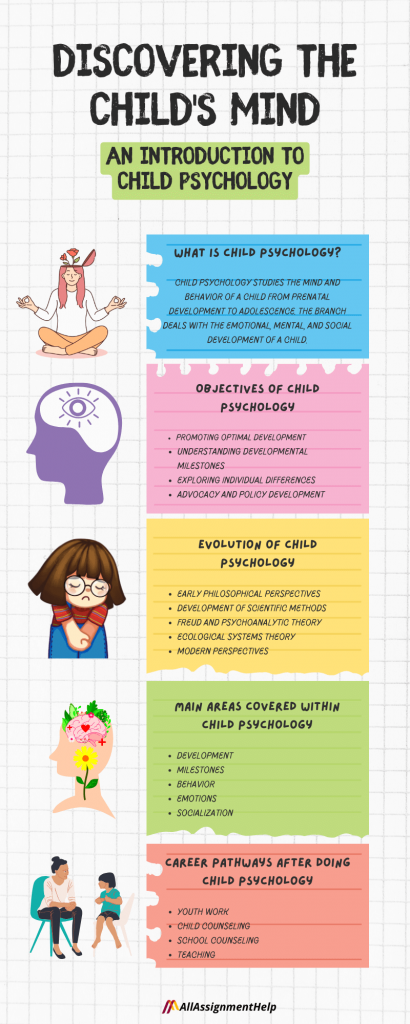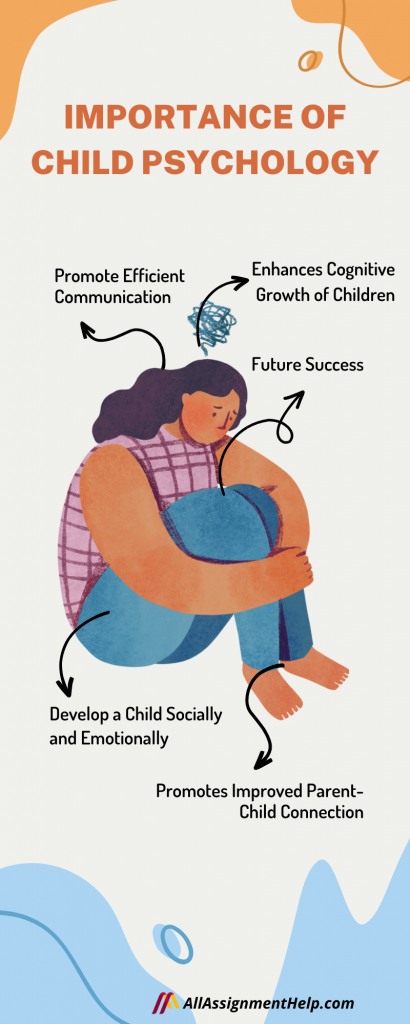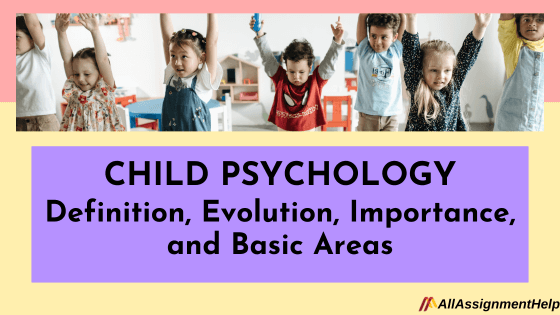Table of Contents
Psychology is a broad field that studies human behavior across a range of age groups and situations. It is the study of the human mind and behavior and includes various sub-branches targeting different areas and child Psychology is one the important branches of psychology. It is the scientific study of human evolution that focuses mostly on newborns and young children. However, the branch has expanded to include development, adulthood, aging, and even life itself!
Speaking with a child and getting the information you need might be a difficult process. Therefore, the study of various social behaviors that contribute to psychosocial development is the sole foundation of child psychology. However, there is a lot to know about this particular branch of psychology. We have everything there is you need to know about child psychology. Read this blog created by one of the subject experts at All Assignment Help to know more about the different aspects of child behavior psychology.
What is Child Psychology?
Child psychology studies the mind and behavior of a child from prenatal development to adolescence. The branch deals with the emotional, mental, and social development of a child. Psychologists discover that child psychology is unique and complex. Therefore, they have questions in mind regarding their experiences. They argue whether early experiences matter more or later ones, or whether nature or nurture plays a greater role in child development.
As a child may not be able to communicate verbally, child psychology looks for alternate ways to assist them deal with their worries and fears using psychotherapy techniques or clinical child psychology that help in the reconfiguration of traumatic experiences. Furthermore, the child will express themselves through behaviors and an emotional loss of control, which can be managed with the help of clinical strategy development and by creating an atmosphere that is progressively safer for their development.
Read Here: Different Psychology Courses to Look Out For

The Objectives of Child Psychology
The main objectives of child psychology are:
- Determining social as well as environmental aspects for the ideal environment for child development.
- Child psychology explains in what ways genetics and environmental factors influence a child’s personality.
- Provide evidence that a particular personality characteristic may be genetically determined.
- Identify the type of learning in which a stimulus that usually produces an unconditioned response is manipulated to produce a conditioned response, and give an example.
- It discusses the methods to use operant conditioning in encouraging a child to get socialized.
- Application of perceptual recognition approach to understanding happiness and fear in infants.
- Evaluation and explanation of differences between Freud’s, Harlow’s, and Bowlby’s approach of mother-child attachment.
- Explanation of reflection-impulsivity and its significance in cognitive development.
- Study of strengths and weaknesses of social learning theory in explaining language acquisition.
- Explanation of why intelligence is or is not overall genetically determined.
Knowledge of this type of psychology is most relevant to careers in psychology, counseling, and teaching. However, professionals in many other fields benefit from a deeper understanding of child personality development. Also, those who lack even a basic understanding can always opt for taking child psychology assignment help from experts available online.
Evolution of Child Psychology
Children have always been treated like little versions of adults, to the point that they have had to work alongside adults in mainstream jobs and have historically been clothed like adults. Within this context, the psychology of the children was a foreign concept.
- Many people consider Jean Piaget to be the father of contemporary child psychology. His research, starting in the 1920s, provided credibility to the notion that children and adults had distinct ways of thinking.
- However, one of his most significant achievements was the realization that children go through many phases of emotional and mental development during their childhood.
- Additionally, he suggested that the emotional, social, and physical development of an individual is intimately related to their intellectual growth.
- Piaget developed the concept of through interaction and firsthand observation. Furthermore, he listed the several phases of childhood learning development and discussed how children perceived the world and themselves at each one.
Nowadays, child psychologists have a strong passion for supporting children’s healthy and appropriate growth and development. They are interested in a variety of subjects, such as parenthood, education, societal pressures, and self-esteem. This is why they also take advanced child psychology courses online to keep themselves updated with the current trends and knowledge. Yet, enrolling in an online course isn’t always as straightforward as it appears. One might get stuck in between and need someone who can take my online psychology class for me. There is no need to worry if you come across such a situation. There are numerous services at your disposal where you can hire an online class helper for assistance. You can get help from such services to relieve the stress of taking your online classes.
Importance of Child Psychology
You may be wondering why psychology is necessary since children are always playing and don’t experience stress. Parents sometimes mistakenly believe that their children’s strange behavior or carelessness with their schoolwork are just acts of mischief. Children have difficulties when learning. Oftentimes, parents misunderstand their children. Therefore, parents must comprehend their children and their problems. Here is where the psychology of the war child enters. This is why it is significant to know the importance of child psychology which are:

To Promote Efficient Communication
Creating a good communication channel between a child and their parents or teachers is one of the responsibilities of child psychology and childhood psychologists. A child spends the majority of their interactions with these initial few persons. Thus, knowing the requirements of a child through child psychology facilitates improved communication.
Develop a Child Socially and Emotionally
The development of children’s social and emotional skills is another reason why child psychology is crucial. They pick up on the thoughts and feelings of a youngster, including trust, fear, pride, confidence, friendship, and so forth. These are the types of skills that fall within the social and emotional development area.
Enhances Cognitive Growth of Children
Cognitive development is the area of development that deals with logic, reasoning, language, mental processes, problem-solving abilities, and the ability to make decisions. Child psychology helps in the development of these skills. It monitors how well children are growing in all areas and how well they can interpret simple information.
Promotes Improved Parent-Child Connection
While children are under a lot of strain and can become disoriented in their jobs, parents often believe that their children have little to do. For example, the mother has said no when the grandmother requests to eat. As a child and a grandchild, they become confused. Thus, child psychology helps in improving parent-child relationships by helping parents comprehend the pressures placed on their children.
Understanding the requirements of a child is much easier with the help of child psychology. Rather than making quick judgments when you don’t understand the conduct of your child, think it through and make an effort to understand them. Just being thoughtful, interested, and adaptable makes a big difference, even if you don’t understand the motivations behind their actions.
5 Main Areas Covered Within Child Psychology
Child psychology is divided into five fundamental sections which are discussed below:
Development
Child development is divided into three broad categories: Physical, cognitive, and socio-emotional.
- Physical development: It is a stable process and a predictable one too. It refers to body changes and acquiring certain skills. For example, gross motor and fine motor coordination.
- Cognitive development: It is a process of gaining knowledge in children. It includes language, thought, reasoning, and imagination.
- Socio-emotional development: Emotional development includes feelings and the expression of feelings, whereas social development is the study of interpersonal relationships.
For ease of study and understanding, they may be divided into different categories. However, development in one area has a strong influence on the other two.
Milestones
Milestones are the parameters used to a child’s development, to know what an average child can do at a specific age.
Child psychologists usually judge a child’s ability on four main milestones.
- Physical milestones: Related to gross and fine motor skills.
- Cognitive milestones: Related to a child’s aptitude for learning and problem-solving
- Socio-emotional milestones: Child’s ability to show emotions and response to social interaction.
- Communication and language milestones: This involves the development of a child’s verbal and non-verbal communication skills.
Behavior
Children are naughty, and impulsive at times. Furthermore, there are lots of conflicts between parents and children. Such kinds of behavior changes are common and normal. These behavior changes are part of the growing process. However, there are children with extreme behavior. There are some behavioral disorders associated with such children. Hiring a child educational psychology assignment help expert can help you understand the reasons behind the abnormal behaviors of children.
In a few cases, such kinds of behavioral issues are acute, or we can say temporary due to a stressful stimulus. But when these extreme behaviors carry for a long time, then it’s not appropriate for the child. This indicates some serious behavioral disorders such as OCD, ADHD, and ODD these behavioral disorders have common symptoms, and they can further increase with behavioral problems.
Emotions
Development of emotions involves the understanding of feelings and emotions, why feelings occur to a particular stimulus, recognition of one’s feelings and feelings of others and ways to manage them. These things come under emotional development. However, the development of emotions begins during infancy and continues into adulthood. The first emotions of babies are joy, anger, first cry, and fear. Then, they develop emotions like shyness, surprise shame, etc., late in life. Children learn emotional coping methods and adopt different strategies to manage them.
Emotion regulation is different for different children. Some easily learn to regulate emotions and others face difficulties. Some react to emotions simply whereas some react to any emotion aggressively. Child psychologists must manage those children and help them to overcome the problem of erratic emotions.
Socialization
Socialization involves acquiring the skills and knowledge to interact in a social atmosphere. This helps in a positive contribution to family, school, and community. The initial period of childhood is a period when social development takes place. The child’s primary relationship is with parents. This relationship affects his/her other relationships later in life.
When a child goes into a peer relationship, he/she learns to interact more in social conditions. However, those children who fail to develop socially face some serious problems later in life. They tend to become aggressive or impulsive. They engage themselves in socially destructive actions. Psychologists try to curb this hostile, aggressive action of these children and make them grow constructively.
Child psychology is one of the main branches of psychology. If you have a good knowledge of child psychology, you can easily understand children’s behavior.
Also Read: Clinical Psychology – Definition, Career, How to Become A Clinical Psychologist
Career Pathways After Doing Child Psychology
Knowledge of child psychology is most relevant to careers in psychology, counseling, and teaching. However, professionals in many other fields benefit from a deeper understanding of childhood development.
The Child Psychology course is for those who are working in, or willing to work in the following fields:
- Youth work
- Child counseling
- School counseling
- Teaching
- Child psychology
- Social work
- Childcare
The Child Psychology courses online can be used as a foundation towards further study and qualifications, or for personal development. Enrolling yourself in an online course could give you the head start you need, and fill you with the inspiration you desire to push on with your plans. Also, it will give you ample options where you can even hire someone to take your online course for you to raise your overall grades and credits in your course.
FAQs
| Which role does child psychology play in education? Child psychology supports educators in creating distinct teaching methods that work with all students. Additionally, people with learning disabilities like ADHD, autism, etc., receive extra attention. |
| How does child development differ from child psychology? The study of child development focuses on how children develop and change during several life stages, including childhood, adolescence, toddlerhood, and infancy. The study of cognitive and intellectual development as well as the application of broad psychological concepts to early life is known as child psychology. |
| What advantages can child psychology offer? Child psychology offers important insights into how children develop socially, emotionally, and cognitively. This makes it possible for adults to understand their requirements more clearly and offer suitable counsel. |
